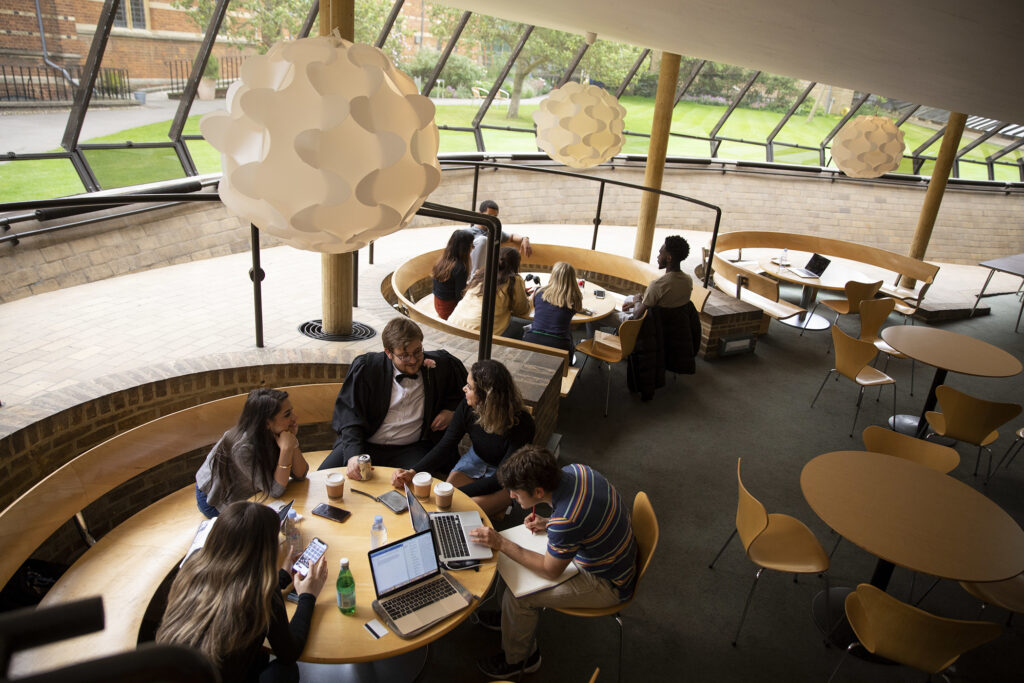Studying abroad in college can be a glamorous, once-in-a-lifetime learning opportunity.
But is it also a distraction that slows students from completing degrees and moving on with careers? According to a new study from the University System of Georgia, not at all.
How study abroad affects graduation
The study compiled semester-by-semester records from 221,981 students across 35 U.S. institutions. Of those students, more than 30,000 had studied abroad.
The analysis found education abroad had positive impacts on graduation within four and six years and on cumulative GPA. It also revealed that students who study abroad earn slightly more credits, but it takes them less time to complete a degree.

(L-R) Undergraduates Jordan Boughner, Caroline Brock, Madelaine Kinnebrew and Emily Rogers walk with their landscape architecture class down Via Nazionale for a class activity in the city in Cortona, Italy. (Photo by Andrew Davis Tucker/UGA)
“Graduation rates and time to graduation lie at the heart of the central value proposition for higher education,” said Donald Rubin, professor emeritus in communication studies at the University of Georgia’s Franklin College of Arts and Sciences.
Rubin co-authored the study, and was also the research director for another large-scale federally funded research project that analyzed the effects of studying abroad on learning outcomes by assessing (among other factors):
- potential benefits of study abroad experiences
- psychological and social outcomes of studying abroad
- foreign language proficiency and advantages
“Over time, we were able to see that if you undertake education abroad, it’s not going to impede completion of your degree. In fact, the evidence shows that it will accelerate time to graduation relative to peers who don’t study abroad.”

Undergraduate James Davidson sketches the Leaning Tower of Pisa during a study abroad excursion to Pisa. (Photo by Andrew Davis Tucker/UGA)
The data was compiled by the Consortium for Analysis of Student Success through International Education (CASSIE), a partnership with the University System of Georgia and the Institute of International Education. CASSIE is funded by the U.S. Department of Education’s International and Foreign Language Education Office.
Boosting international education for everyone
There are important questions about who participates in study abroad and how to expand the types of students who do.
“We know that students who choose to study abroad are atypical in many ways,” Rubin said. “They may be better students, have better organizational skills.”
The project recorded students’ gender, race, age, their high school GPA and SAT scores, and whether they had need-based status.

(L-R) Undergraduates Annie Kaur, Oxford student Toby Peterken, Isabella Sekelick, Cody Wertheimer, and below, Sarah Jane Foley gather to talk and study at the bar at Keble College in Oxford. (Photo by Andrew Davis Tucker/UGA)
But the focus of this research was on the actual benefits of studying abroad.
“If we can help people understand that there are tangible, measurable benefits to studying abroad, then that actually feeds the case for improving participation rates, particularly for underrepresented groups,” he said.
That’s important because his research shows that students from underrepresented or minority groups tend to benefit the most from studying abroad. According to the data, students who receive need-based aid are less likely to study overseas. However, when these students participate in international education, they are much more likely to graduate in four to six years than students on need-based aid who don’t.
Financial aid is a powerful force in helping students decide to go and study abroad. To recruit a more diverse, lower-income pool, Rubin said, institutions could offer more study abroad scholarships and stipends to these students.
Is studying abroad worth it?
Decisions about study abroad opportunities can come with complicated cost-benefit analyses. The study’s authors say students and parents should consider international education’s positive influence on degree completion when they make up their minds.

Oxford Program Director James McClung (right) gives a tour of Trinity College to a group of Junemester students in Oxford, U.K. (Photo by Andrew Davis Tucker/UGA)
“We know that international education experiences can enrich students’ lives both on and off campus,” said Angela Bell, vice chancellor for research and policy analysis for USG and co-author on the study. “This work confirms that and quantifies that education abroad, in particular, promotes on-time college completion.
“This type of research is especially important in providing practitioners empirical information on the value of international education experiences that can be used in advocacy and campus decision making.”








